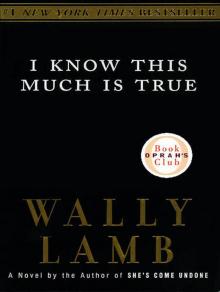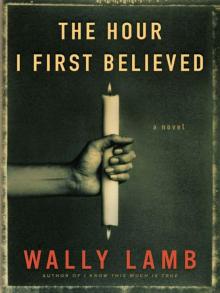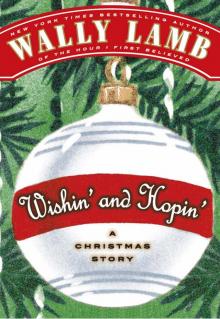- Home
- Wally Lamb
The Hour I First Believed Page 2
The Hour I First Believed Read online
Page 2
“So what are you—some no-life chick’s gotta borrow her friend’s business?” I asked.
“This is my business, okay?” she said. “I’m Casey’s godmother.”
“You’re fat, aren’t you? You have a fat voice.”
“Do you know who bought Trina and Paul the lot they’re building their house on? Trina’s father, that’s who. The month before he died.”
“Your options are limited, right? It’s either Tina’s problems or a spoon, a pint of Ben & Jerry’s between your knees, and Touched by an Angel.”
“Her name’s Trina, okay? And my personal life is none of your business. Just tell your little slut of a wife that if she thinks she’s moving into Trina’s new house when it’s finished, she’s…she’s…”
There was dead air for a few seconds, some muffled whispering. Then the avenger was back on the line, blubbering. “I am trying to stop your wife from destroying my friend’s marriage. Okay?”
“Yeah, sure, Fat Chunks. Your Nobel Peace Prize is in the mail.” I can’t remember which of us hung up on the other.
I paced, muttered. Sent my students’ blue books flying and the dogs running for cover. When I realized the cordless phone was still clenched in my hand, I whacked it five or six times against the refrigerator door. My car keys were on the counter. I stared at them for several seconds, then grabbed them.
The trucks hadn’t sanded Bride Lake Road yet, but I kept mislaying the fact that the road was icy. Passing the entrance to the women’s prison, I spotted oncoming headlights and hit the brakes. The fishtail I went into nearly sent me crashing into the security gate. My heart thumped. My breath came out in short blasts. I remembered who Paul Hay was.
I’d met him a couple of times at her staff parties. Reddish hair, bearish build. We’d small-talked. He’d tried home brewing once, but it had come out watery. He liked the Mets. Maureen was nurse-supervisor at Rivercrest Nursing Home back then, and Lover Boy was in her pool of per diem LPNs.
The karate school where she took tai chi was in a strip mall near the Three Rivers depot. There’s a convenience store, a bike shop, Happy Joy Chinese, and Caputo’s Martial Arts. The plate-glass window was foggy. I got out, walked to the door, opened it a crack. Twenty or so little kids in karate suits stood with their hands clasped as if in prayer. “Bow to the master, bow to the flag,” the instructor said. Well, okay, I thought. She’s guilty.
I slipped and slid my way back home. No car in the garage. I fed the dogs, picked the exam booklets off the floor, picked up the phone. No dial tone; I’d killed it. Two Johnny Walkers later, she came through the door with Chinese food. “Hey,” I said. “How was it driving?”
“Not great, but I lucked out. I followed the sand truck all the way up Bride Lake Road. You eat yet?”
“Nope.”
She hit the message machine. Her J. C. Penney order was in, one of her first-shift nurses was taking a “mental health day” and needed a sub. She put on a pot of tea, set two places, and opened the cardboard containers. “Look at this,” she said. Her open palm was piled with soy sauce and mustard packets. “If someone consumed all this sodium, they’d have a stroke.”
“So why’d you drive across town to the other place when you were right next door to Happy Joy?” I said.
“Because last time you said Happy Joy’s too greasy.”
Which was true—I had. It was.
We spooned out the food. The kettle whistled. Maureen got up to get our tea. “What happened here?” she asked. Her fingers were skidding along the refrigerator door.
“What?”
“These dents?”
“Tell me,” I said. “Who gets on top, you or him? Or do you alternate?”
Okay, this next part’s hard. I’m not proud of the moo shu and orange chicken dripping down the wall. Or the fact that when she tried to leave the room, I grabbed her so hard by the wrist that I sprained it. Or the fact that she totaled her car on her way to her friend Jackie’s apartment.
She wouldn’t come back. She wouldn’t take my calls. Each day, I went to school, taught classes, endured staff meetings, drove home, and walked the dogs. I spent my evenings calling Jackie’s number on our brand-new phone. Redial, redial, redial, redial. When Jackie’s boyfriend warned me to stop calling or else he’d have the calling stopped, I said okay, fine, I didn’t want any trouble. I just needed to talk to my wife.
Next day after school, I drove over to the town hall and found out where Hay was building their dinky little shoebox of a house. It was out in the sticks, out past the old gristmill. I drove out there around dusk. The place was framed; the chimney was up. Overhead was a pockmarked moon.
I drove back there the next morning, a Saturday. His truck was there. He was up on the second floor. He squinted down at me, puzzled. I cut the engine. That’s when I saw it, in the seat well on the passenger’s side: the pipe wrench I’d borrowed from Chuck Wagner to tighten our leaky hallway radiator valve. It wasn’t premeditated. I’d meant to return that wrench for a week or more. But suddenly its being there seemed just and right. There was a fire in my head.
Six weeks after that moment, in a darkened classroom at Oceanside Community College, I would learn via an anger management class video about the cardiology, neurology, and endocrinology of rage—about how, as I reached for that wrench, my hypothalamus was instant-messaging my adrenal glands to secrete cortisol and adrenaline. How stored fat was dumping into my bloodstream for an energy turbocharge. How my heart was pumping overtime, sending a surge of blood to my muscles and lungs in preparation for what that instructional video called “the evolutionary miracle of fight-or-flight.” That morning, I saw Hay and took the former option.
Took out his windshield. Took the wrench to his stacks of not-yet-installed Andersen windows. When he came flying at me, I took a swing at his head that, thank God, didn’t connect. He head-butted me, knocked me backward, gave me a cracked rib and a busted lip, a bruised tailbone.
They arrested me that afternoon. Hay got a restraining order. Maureen got me out of the house and would not let me take the dogs. We all got lawyers. Mine, Lena LoVecchio, was a friend of my Aunt Lolly’s. Her manner was brusque, her hairstyle a shellacked mullet. There were two framed posters on the wall behind her desk: the UConn women’s basketball team with their championship trophy and Kramer from Seinfeld.
“How come he gets to screw my wife and be the victim?” I asked Lena.
“It’s all about the wrench,” she said.
I tried to explain to Lena how I’d reached the point where there was nothing between me and the pain of my wife’s betrayal. She kept nodding, sad-eyed, her fingers stretching a rubber band. When I stopped talking, she said, “I’m your attorney, Caelum. Not your therapist.”
Pending disposition of the case, I took a mandatory unpaid leave of absence from teaching. Took Aunt Lolly up on her offer to have me come stay at the family farm with her and her don’t-ask-don’t-tell companion, Hennie. (It was April, and my aunt was as practical as she was sympathetic; I got room, board, and laundry service in exchange for plowing and manure spreading.) I took the deal the lawyers hammered out. In exchange for two hundred hours of community service, completion of the anger management class, and restitution on all that broken glass out at the Hays’ hacienda, I got the assault and damage charges reduced to misdemeanors. That meant probation instead of prison and a shot at qualifying for “accelerated rehabilitation.” It would be the judge’s call. If I got it and behaved myself for a year, my criminal record would be wiped clean and I could teach again. My case was on the docket for August the first.
I missed school—the kids, the daily grind. Had Melanie DeCarlo gotten into one of her dream schools? Had Mike Jacaruso gotten that soccer scholarship? When the Wildcats made it to the semifinals in basketball, I drove up to their big game against Wethersfield. Made the mistake of sitting in the Three Rivers section. I left at the half, though. I couldn’t take the fact that, although everyone was packed in ti
ght on those bleachers, I had room on either side of me. Couldn’t take the whispering, the swiveling heads: that’s that teacher who…
The community service piece was punishment by acute tedium. I’d have been okay with a soup kitchen or group home assignment, but they gave me data entry at the DMV—six mind-numbing hours every Saturday for thirty-three weeks.
Hey, you think those Motor Vehicle employees are charmers when you’re in line? You should feel the love when you’re one of their community service penitents. This one woman? Had Disney crap pinned up all over her cubicle walls? She goes to her supervisor and accuses me of helping myself to the M&Ms in the glass canister on her desk. Which was bullshit. She’s blowing her nose every two minutes and leaving used Kleenex all over her desk, and she thinks I want to get within ten feet of that germ pool?
And then there was anger management: twelve three-hour sessions run by Beth the Ballbuster and Dredlock Darnell, who, I’m guessing, must have been at least a semifinalist for Dunkin’ Donuts’ Customer of the Decade. They had this good cop/bad cop thing going, those two. He’d expound on “our feelings as messengers” and play the pathetically dated videos—The Blame Game, Slaying the Dragon Within. She’d try her best to incite us, drill-sergeant style, cutting off at the knees any guy clueless enough to claim that he didn’t really have to be there or that, on some level at least, his wife or girlfriend had asked for it. “Bullshit!” Beth declared, in the middle of one sap’s poor-me ramble about the connection between his mother’s ridicule and the fact that he’d sunk a barbecue fork into his nagging wife’s leg. “Stop using your lousy childhood as an excuse, and stop calling her ‘the wife.’ She has a name, doesn’t she? Use it. And face the fact that you’re a domestic terrorist.” During break midway through our second session, I’d rolled my eyes and quipped sotto voce to Beth that some of the bulletheads in our class probably needed stupidity management more than anger management. “Mr. Quirk, are you under the mistaken impression that we facilitators are your peer group?” she asked. “Because we’re not. You’re in the abusers’ group.” After that icing, I joined the smokers and gripers outside, neither nodding at nor challenging their mumblings about wasted time, whale blubber, and femiNazis.
I learned things, though. The curriculum may have been redundant, Darnell may have had food issues, and Beth may have bulldozed her way through resistance rather than dismantling it the way a more skillful teacher might have done. (“Hey, you don’t want to fix yourself? Fine. Drop out. I’m not the one who needs the signed certificate.”) Still, I went away with a better understanding of the biology of anger, what triggers it, and what I could do to short-circuit it. More than that, I had a twelve-week dose of humility. Man, I hated the sick-to-my-stomach feeling I got driving to that class every week. Hated the beat-up/riled-up feeling I always had afterward. Hated facing up to the fact that, whether she’d been unfaithful to me or not, if Maureen had gotten killed that icy night when she totaled her Toyota, it would have been my fault because she’d left out of fear. If I’d bashed in Hay’s skull with that pipe wrench, his death would have been on me. I was in the abusers’ group, not the group for the abused; that’s what I learned. My childhood grudges, my righteous indignation, and my master’s degree didn’t count for squat. My Phi Beta Kappa key unlocked nothing. I was my failings and my actions, period. Like I said, it was a humbling experience.
In court, Hay’s lawyer stood and asked the judge if his client could speak. Attorney LoVecchio and I exchanged uh-oh looks; this wasn’t in the script. This couldn’t be good.
In the months since the incident, Hay said, he had rediscovered His Lord and Savior Jesus Christ. He had broken the ninth commandment and had come to understand that he bore responsibility for the outcome of those trespasses. He was not a vindictive man, he said. He was sorry for the hurt he’d caused. He hoped I could forgive him as he had forgiven me. He looked right at me when he said that last part. I looked away from him. Looked back and nodded. The judge granted me my “accelerated rehab.”
Maureen had filed for divorce by then. That fall, I helped Lolly and Hennie with the milking and the apple and pumpkin sales. I also resurrected the Bride Lake Farms corn maze. During the fifties and early sixties, the maze had been a Three Rivers tradition; we’d get a couple thousand paying customers going through that thing in season. “People like to get lost for a little while,” my grandfather used to say. But the maze’s popularity had petered out during the late sixties, maybe because, by then, most of us were already more lost than we wanted to be. Out in the old desk in the barn, I found my father’s pencil sketch for the original three-acre labyrinth, dated 5/12/56, and duplicated that. Did a decent enough job of it, so I went down to the newspaper and tried to get the features editor interested in doing a nostalgic story. “The Return of the Bride Lake Farm Corn Maze,” something like that. She wasn’t interested, though, and we couldn’t afford paid advertising, so the whole thing kind of fizzled. I mean, we got some families on the few weekends that weren’t rained out, and a few school groups during the week, but it was nothing like when I was a kid, when the cars would be parked a quarter of a mile down Bride Lake Road.
I took a stop-gap second job as night baker at Mama Mia Pastry, which was how I’d put myself through school back in the seventies. Mr. and Mrs. Buzzi had both retired by then, and their surviving son, Alphonse, was running the biz. The Buzzis’ older son, Rocco, and I had been high school buddies, then roommates at BU, seatmates at Sox games. Being back at the bakery felt like a demotion, especially since, technically, Alphonse Buzzi was now my boss. When he was a kid, his brother and I used to tease Alphonse mercilessly. He’d ask for it, you know? Squeal on us, ambush us with water balloons. “Baby Huey,” we used to call him, and he’d go crying to his mother. After Rocco died, Alphonse became a friend by default, I guess you could say. He was still annoying, though. Still a baby. My first wife? Patti? She was always trying to fix him up with women from her bank, but nothing ever took. I mean, even now, the guy’s in his mid-forties—runs a business, for Christ’s sake—and you know what he’s into? Paintball. You know what’s sitting on top of the file cabinet in his office? His friggin’ Super-Soaker.
But anyway, nighttime baking suited me okay; I wasn’t sleeping for shit anyway. I kept telling myself that my year away from teaching gave me the perfect opportunity to write again—kept feeding myself that “Life gives you lemons, make lemonade” crap. I bought a three-ring binder and a three-hundred-sheet package of loose-leaf paper. Put the paper in the binder, snapped the rings shut, put a pen in the pocket, and put it on the nightstand next to my bed. But I didn’t write again. Didn’t open that fucking loose-leaf binder once.
And then Maureen called me. Out of the blue, on Halloween night. Well, it was one in the morning, so, technically, it was already November the first. All Saints Day, I remembered, from my Catholic childhood. Mo was crying. She was scared, she said. Sophie, the older and needier of our two mutts, was sick. Dying, maybe. Dogs could die from too much chocolate, right? Maureen had overplanned for trick-or-treaters, then gone to bed, leaving most of the unclaimed candy in a bowl by the door. Sophie had chowed down on thirty or forty of those miniature Hershey bars, wrappers and all. She’d been vomiting chocolate, paper, and foil nonstop for two hours. The vet’s answering service wouldn’t pick up. Could I come over?
I stopped at the all-night convenience store on my way and bought Pepto-Bismol. Sent Maureen to bed and stayed up with Soph for the rest of the night. She stopped retching around three in the morning. I sat there, watching her sleep, her chest heaving. By dawn, her breathing had normalized. By seven, she was up again, looking better and wanting breakfast.
One thing led to another with Mo and me. She’d tell me okay, I could come over for a cup of coffee. “One hour,” she’d insist. The first time, she even set the stove timer. Then she let me take her out to dinner. Then we started walking the dogs out by the reservoir. Started watching UConn basketball on TV. One nig
ht when I went over there, I brought a bottle of wine, and we drank it and made out on the couch. Made our way to the bedroom. We were awkward with each other, out of synch. I came before she was anywhere near ready. “It’s okay,” she kept saying. “It’s fine.”
Later, after I’d started dozing, she said, “Caelum?”
“Hmm?”
“Tell me a secret.”
At first I didn’t say anything. Then I said, “What kind of secret?”
“Something you’ve never told anyone before.”
Mr. Zadzilko, I thought. I saw his broad face before me, the bare lightbulb hanging from the ceiling of the utility closet. “I don’t…I can’t think of anything.”
“Tell me something about your ex-wife.”
“Patti?”
“Francesca. You never talk about her.”
I rolled toward her, onto my side. And because I wanted to come home again, I complied. “Well,” I said. “When I started writing my book? She bought me a computer. My first computer.”
Mo said that wasn’t a secret. It didn’t count.
“Yeah, but wait. The day she left me? She took her house key—the one she left behind—and scratched something onto the face of the monitor.”
“What?”
“Two words: emotional castrato…. Like our whole marriage was my fault. Like her living in New York all week and coming home on weekends—some weekends, I should say, fewer and fewer, actually—like that had nothing to do with it. And here’s what a freaking masochist I was: I lived with that goddamned monitor. Kept typing away, squinting around and past those words. It was four or five months before I unplugged the fucker and hefted it out to the curb. Lifted it over my head and dropped it face-first onto the sidewalk, just so I could hear the pleasure of it crash. Spring cleanup, it was, and the town trucks were driving around, picking up people’s bulky waste. And the next morning, I heard the truck and stood at the window. Had the pleasure of watching them haul it away…. So there’s your secret.”

 I Know This Much Is True
I Know This Much Is True She's Come Undone
She's Come Undone The Hour I First Believed
The Hour I First Believed I'll Take You There
I'll Take You There Wishin' and Hopin'
Wishin' and Hopin'